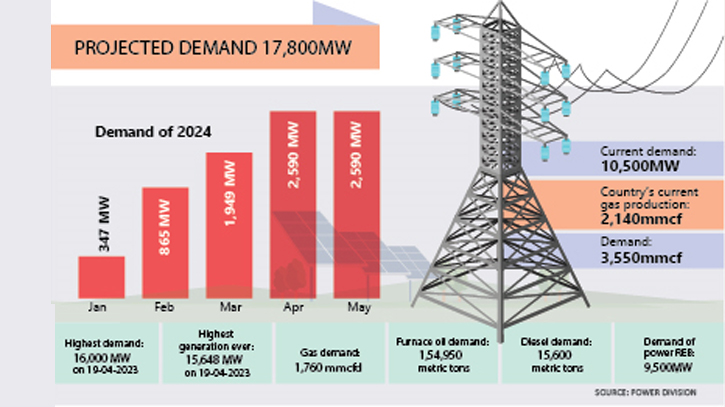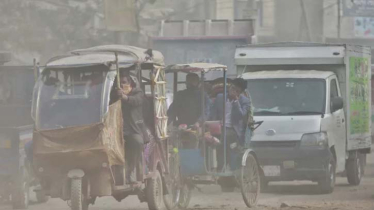
Photo : Messenger
The government has set the demand for electricity in the upcoming irrigation season at 17,800 MW, which is yet to be generated in the country.
Experts believe that meeting the high demand in the peak season, which the country has never experienced, will be a challenge for the government. The government is already grappling with a fund crisis over LNG and fuel oil imports.
Prominent energy expert Professor Shamsul Alam told The Daily Messenger, “It will be a tough challenge for the government to meet the highest demand, as it is already facing a primary fuel crisis and a funding shortage.”
He also said, “The government has eliminated subsidies to agriculture, which is a suicidal decision. Power bills for irrigation are now similar to those for industries. Meanwhile, our fisheries have been affected, leading to a significant decline in protein supply.”
Professor Alam recommended that the government revert to the previous master plan, which provided ample subsidies to agriculture. He warned that otherwise, food security would be under threat.
According to the Power Division, in the last irrigation season, peak electricity demand was 16,000 MW in April. The overall electricity demand is expected to be 17,800 MW during the upcoming irrigation season in 2024. Currently, the total number of irrigation connections is 487,851, with 9,432 pending applications.
However, the projected electricity demand for irrigation alone is 347 MW in January 2024, 865 MW in February 2024, 1,949 MW in March 2024, 2,590 MW in April 2024, and 2,590 MW in May 2024.
According to the Bangladesh Power Development Board (BPDB), the highest electricity generation was recorded at 15,648 MW on April 19, 2023.
Nevertheless, the Bangladesh Rural Electrification Board projects the demand for the next irrigation season to be 9,500 MW.
An inter-ministerial review meeting has been held to ensure uninterrupted power supply to irrigation pumps during the upcoming irrigation season. The irrigation season will start from January 2024 and continue until April 2024.
Muhammad Hossain, Director General of Power Cell, who was present in the meeting, told The Daily Messenger, “The projection is not too high. Only 1,500 MW more will be added to the grid than the previous year. Although we had to implement load shedding last season, the same situation will occur this year as well.”
Regarding the economic adverse situation, he said, “We have been facing this situation since the Russia-Ukraine war in February of last year. So, we have experience in managing the situation.”
Gas demand is expected to be 1,760 mmcfd, with a minimum of 1,540 mmcfd in the upcoming irrigation season. Furnace oil demand is also expected to be 154,950 metric tons, and diesel demand is likely to be 15,600 metric tons. According to the energy department, there is no shortage of furnace oil and diesel.
According to the Energy Division, a total of 29 gas fields have been discovered in Bangladesh. Currently, 2,140 million cubic feet of gas is being extracted daily from 113 wells in 21 gas fields. In the past, up to 2,800 million cubic feet of gas used to be extracted. However, gas production is constantly decreasing.
Senior Secretary of the Power Division, Md. Habibur Rahman emphasized that the supply of gas, furnace oil, and diesel needs to be increased to boost power generation in the upcoming irrigation season while faithfully fulfilling the assigned duties according to the plan for uninterrupted power supply.
He said, “It is necessary to open control rooms in the distribution companies under the power division to monitor irrigation activities, including necessary repairs or renovations of the transmission lines.”
The BPDB wants to maintain communication with concerned officials of the Ministry of Railways, Road Transport and Highways Department, BIWTC, BIWTA, and BPC to ensure fuel transportation in the coming irrigation season.
To guarantee uninterrupted power supply to irrigation pumps, maintenance and repair work on grid substations, transmission lines, distribution lines, and substations should be completed urgently.
The meeting has decided to ensure a stock of fuel oil for a minimum of 2 (two) months’ production capacity in power-generating stations, including the completion of the upgrading of overloaded substations and transmission lines as soon as possible. The formation of a monitoring committee for the supervision of uninterrupted power supply to irrigation pumps and strengthening the activities of the monitoring committee has also been decided.
Messenger/Sajib








